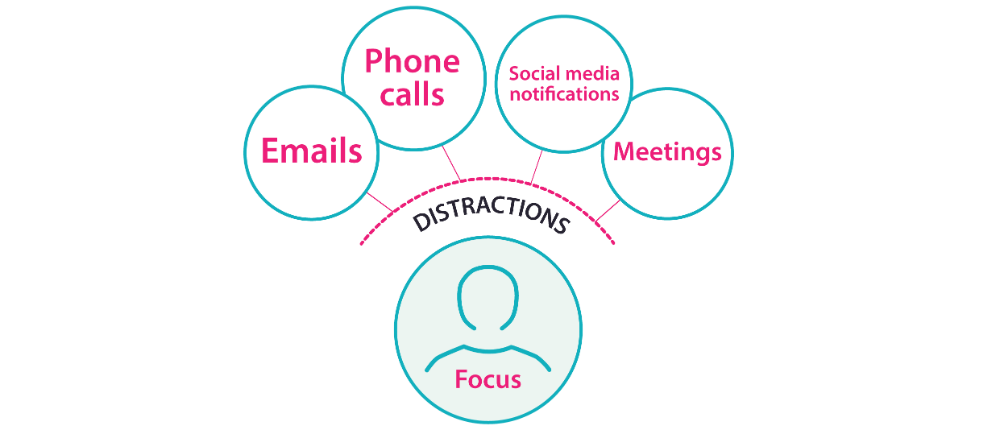
We all seem to have our quirks around time management – whether we’re always 30 minutes early for fear of being late or are always late because we underestimate how long things will take, whether we procrastinate for so long that a decision becomes unnecessarily urgent or rush around so much that we never seem to get anything done.
However, the better we become at maintaining our focus and managing our time, the more we can achieve and the better we’ll feel about both work and personal life.
There are plenty of time management apps to help us track our time and even prioritise the tasks and activities we need to do and when. But first we need to change our mindset and habitual behaviours to make the most of this precious commodity. Here are a few simple time management tips to help you get into the swing of it.

1. Start your day well
A bit like setting yourself up with a healthy breakfast, starting your work day with a bit of planning should help it go well. Spend a couple of minutes first thing looking at what you need to achieve that day, just to make sure you’re focused on the right tasks. Of course, once you get into the hang of planning each day, you may even have prepared your to-do list at the end of the previous day, while taking stock of what you’ve done.
2. Write a prioritised to-do list
Once you’ve identified what you need to do (breaking big jobs down into their component parts if needed), decide on and list the priority tasks – and don’t just put your favourite bits at the top of the list because they’re easy to do.
Consider your deadlines, what’s of the most strategic importance and whether you completing your piece of a project will help someone else in the team crack on with their job more effectively. It’s also a good idea to do the bits you’re not keen on as early as possible, to get them out of the way rather than dreading them as the day drags on. Save the more enjoyable but less urgent bits for later as something to look forward to.
Try to be realistic about how long each task will take. It’s no good allocating a one-hour slot to a job that you know will take half a day, no matter how optimistic you’re feeling. By organising your activities each day you’ll soon learn how long each regular task should take.
Check your list throughout the day so you can tick off any completed items, remind yourself of what still needs to be done and rearrange things if needed. No day will ever run completely to plan and you may have to add new tasks as you go, or rearrange priorities if deadlines change.
3. Cut the distractions and stay focused

Minimising your distractions should help you focus more on what you’re supposed to be doing. If you need to really concentrate on a task at hand, try turning off your email and other notifications and see how much more productive you’ll be. It can be tempting to just have a ‘quick look’ at email or social media for anything urgent but once you’ve broken your flow, it can be difficult to get it back.
4. Expect the unexpected
However hard you try to reduce your distractions, every day comes with its own unexpected interruptions – your computer insisting on installing a Windows update, an uninvited visitor, getting caught in the office kitchen for a lengthy chat about another issue (you know the drill). Or you might just have a bad day when your brain doesn’t seem to respond as quickly as you’d hope. Don’t try to plan your day at 100 per cent capacity – aim for around 80 per cent as a more realistic figure.
5. Is everything on your list really necessary?
Are all your meetings really necessary, or could the output needed be achieved just as easily – and more quickly – via teleconferences, emails and so on, saving time and travel?
Meetings are in fact a great way to waste time if they’re not planned and managed properly. Meetings should have an agenda that you stick to, and they should finish at specific times. This won’t just help you, it will also help colleagues who are expecting you back at the office. Making sure meetings have agendas will also mean the time spent is targeted at important issues that really do need to be discussed round the table rather than becoming a ‘talking shop’.
It’s not just meetings that could be unnecessary – if you’re having a busy day, look at your task list and consider whether any of the jobs really need to be done that day and whether it should be you doing them. For example, any regular admin tasks could perhaps be put off to another time or delegated to release a bit of pressure.
6. Let other people ‘do their stuff’
If you have a team, let them get on with their job. Don’t micromanage or spend more time than necessary catching up with them on their work (and getting in the way); just be there as and when needed for support, to help them work at their most efficient. Delegating with confidence to a team that you trust will free up your time to concentrate on the urgent and important tasks that really do need to be done by you.
7. Organise your workspace
Keeping a tidy workspace might not automatically translate into a ‘tidy mind’, but at least you won’t waste time looking for things. A great filing system on your desk for the documents you need that day can save time, as can a good filing system on the computer. How many times have we all said “I know I’ve saved it but I can’t remember where”?
Similarly, why not create a set of email templates or a framework of documents you use on a regular basis that you can simply call up without recreating them each time?
8. Can you really multi-task?

Many people believe they can multi-task, but in reality what we call multi-tasking is simply flipping between two things before you’ve finished either one of them. You can address this in a similar way to reducing your distractions – when you make your list of tasks, try to group similar tasks together such as admin duties and phone calls so you can do your ‘bits and bobs’ in one time slot and concentrate on meatier pieces of work without having to make calls or respond to emails. You could even consider outsourcing your call answering function or email management to an external provider, so that they can take on the task of handling customer service, diary management and other niggly tasks for you and your team.
Spend a few minutes reviewing your task list every day before you leave the office to see what needs to be carried over and what new tasks need to be added, so you can come into the office in the morning confident in what you need to achieve.
9. Be kind to yourself and your team
Finally, remember that some days simply won’t go as you hope. If you and your team have a great day, congratulate everyone on a job well done. If you don’t achieve everything you wanted, recognise the efforts everyone has made so you can start again in a positive frame of mind the following day. The more motivated you are, the less you’ll drag your heels, and the days at work should simply fly by, full of productivity.

Categories
- 24 Hour Call Answering Service (5)
- After Hours Call Answering (5)
- After-Hours Call Answering Service (6)
- Answer-4u (11)
- Artificial Intelligence (1)
- Business (67)
- Business Grants (3)
- Business Growth (4)
- Business Owner (6)
- Business Strategy (2)
- Call Diversion (1)
- Call Handling Service (12)
- Charity (2)
- Christmas (5)
- Customer Experience (4)
- Customer Satisfaction (3)
- Customer Service (18)
- Customer Services (8)
- Decision Making (2)
- Diary Management (3)
- Digital Marketing (16)
- Disaster Recovery (5)
- EntrepPhase (7)
- Entrepreneurs (7)
- Finance (2)
- Funding (3)
- HR (5)
- Inspiration (2)
- Leadership (4)
- Marketing (15)
- Marketing Strategy (2)
- Networking (2)
- Other (4)
- Outsourcing (5)
- Phone Etiquette (5)
- Productivity (6)
- Property Management (3)
- Recruitment (7)
- Self Improvement (2)
- Small Business (12)
- SME (4)
- Staff Training (2)
- Start-Up (9)
- Technology (2)
- Telephone Answering (16)
- Time Management (4)
- Virtual Assistant (3)
- Virtual Receptionist (12)
- Workforce (9)
- Working Environment (9)
- Workplace (28)





